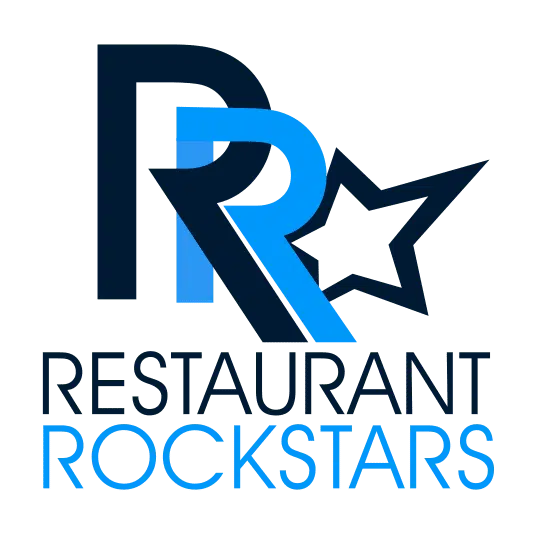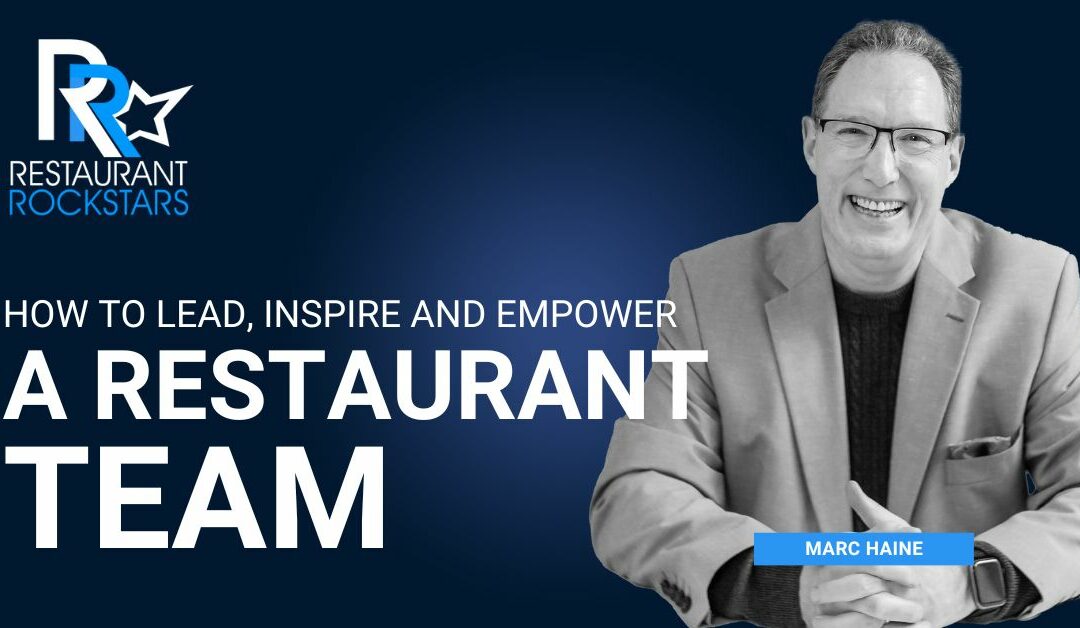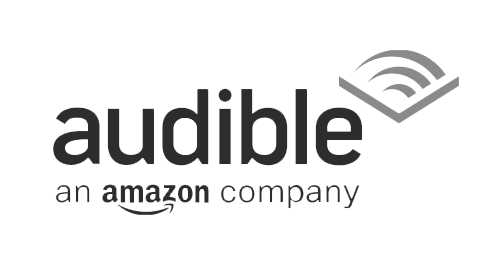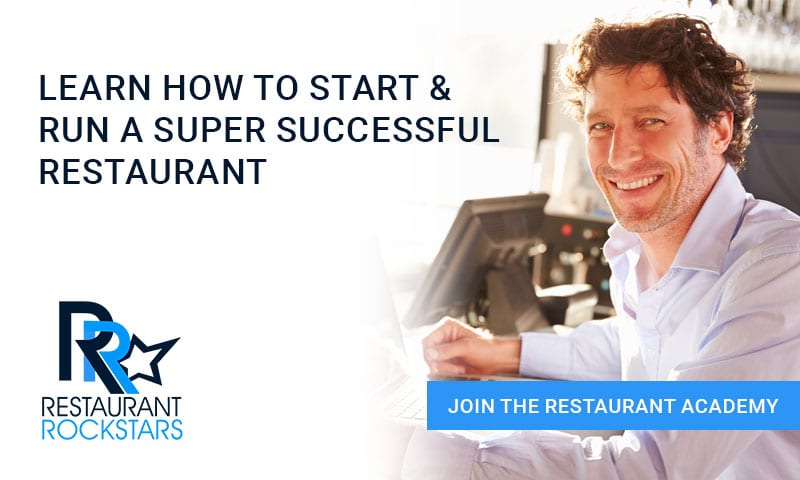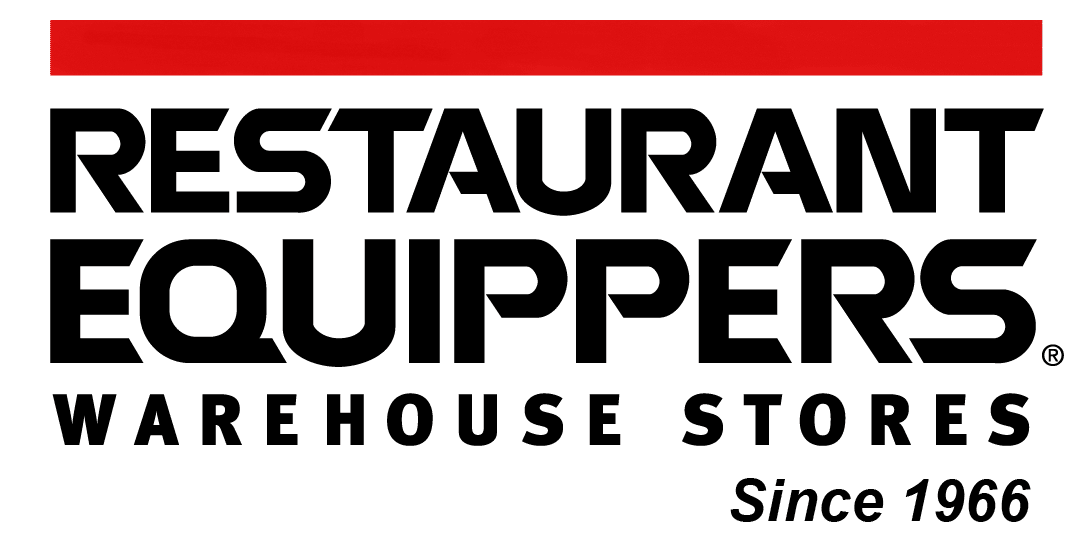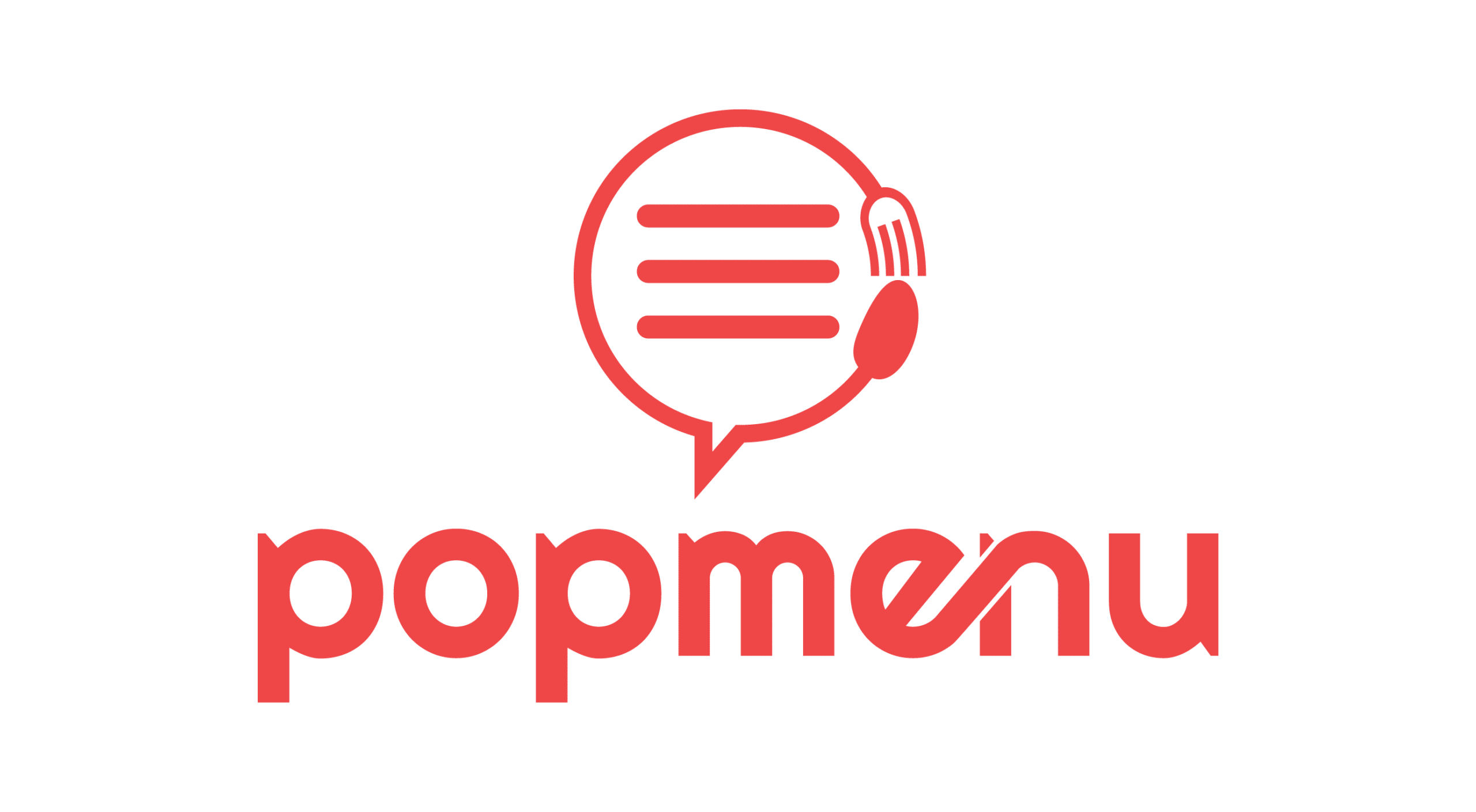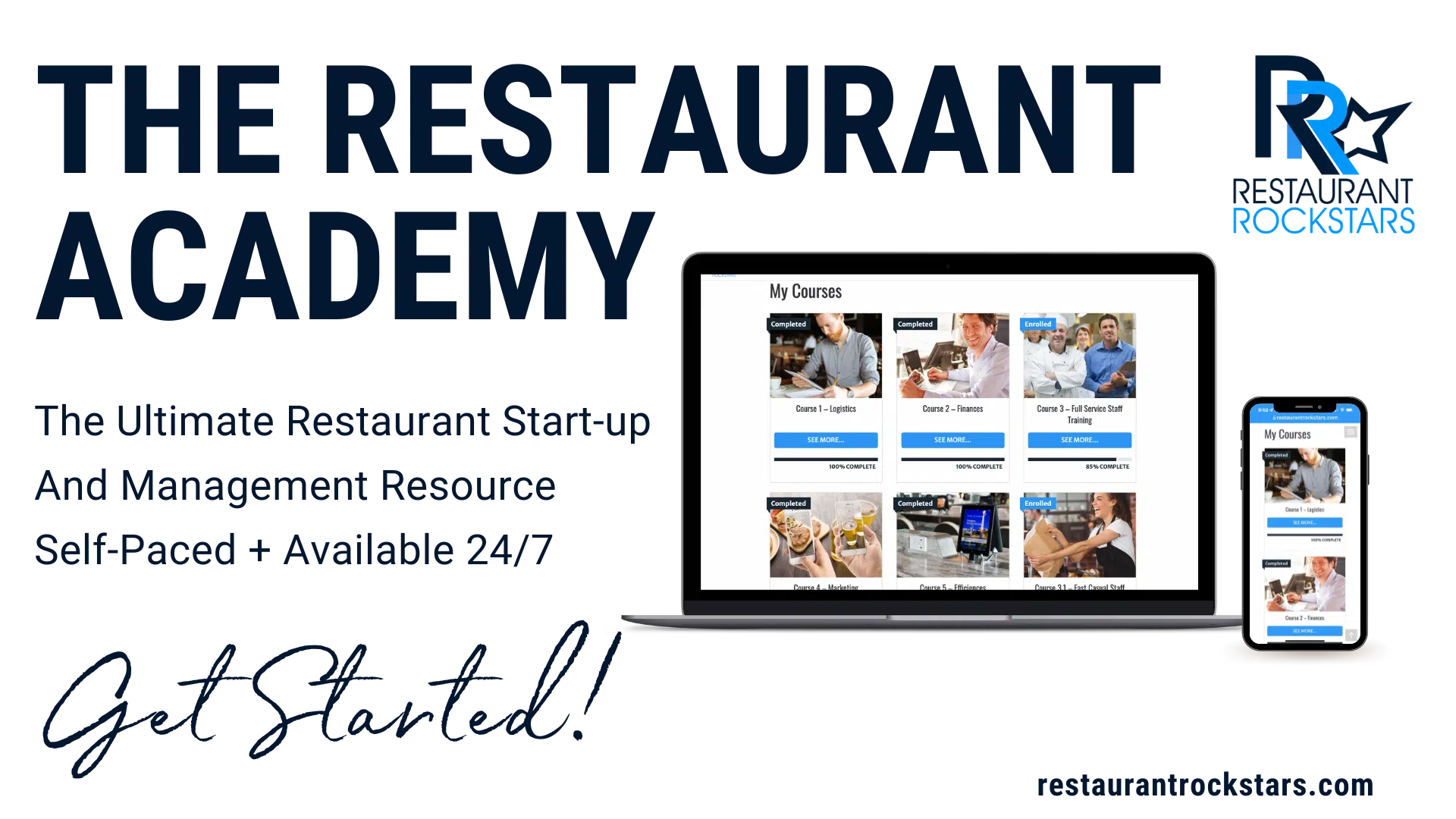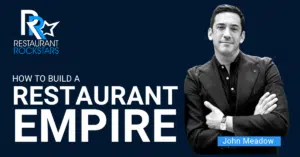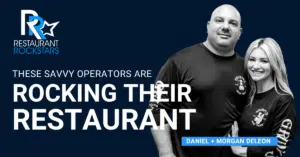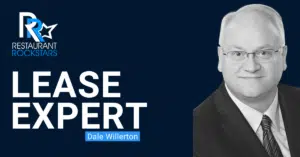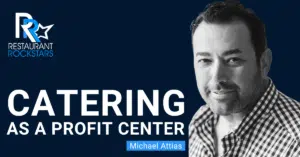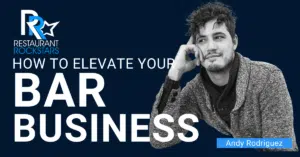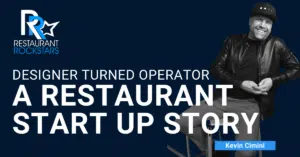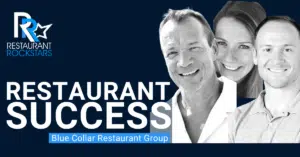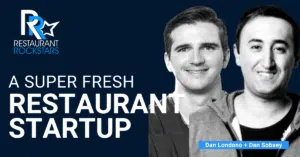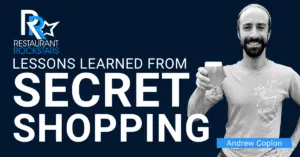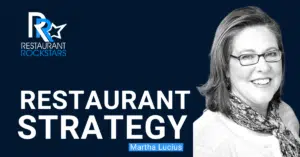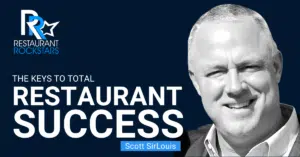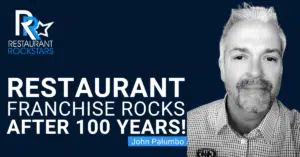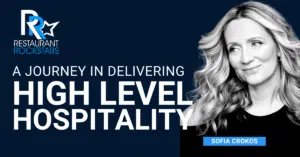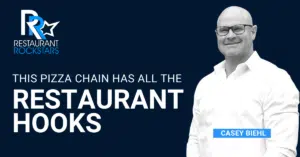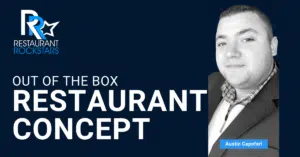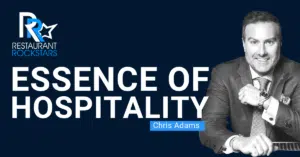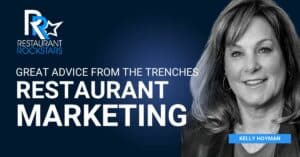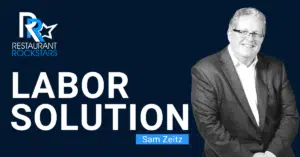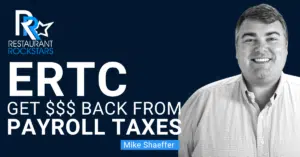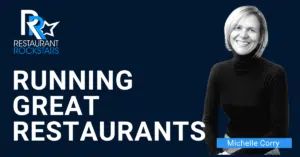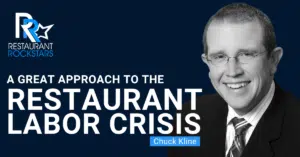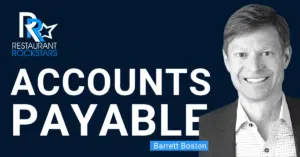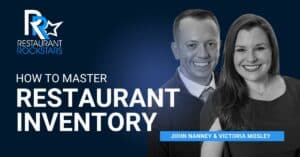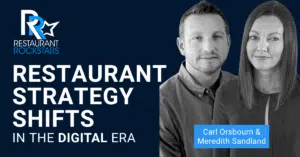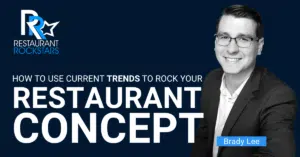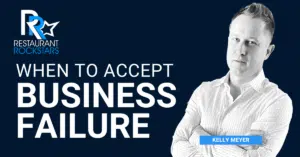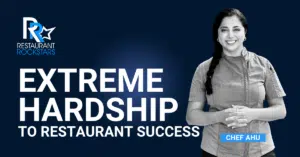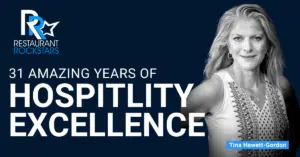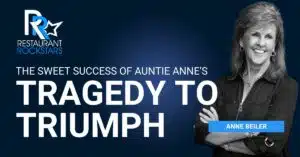Restaurant Rockstars Episode 381
How to Lead, Empower & Inspire your Restaurant Team
LISTEN HERE OR ON YOUR FAVORITE PODCAST PLAYER
We all have a restaurant story!
Some of us started young and worked our way up through the business. Others discovered the restaurant passion later in life.
Now that you’re here, you want to get the most from your restaurant team and learn from other’s experience.
In this episode of the Restaurant Rockstars Podcast, I’m speaking with Marc Haine, a true operator’s operator, about leading and inspiring a restaurant team.
As a young dishwasher Marc went on to master the kitchen. He never lost the hospitality bug and later ran three restaurants, became a Food & Beverage Director.
Marc also founded a hospitality consulting firm, became a podcaster, and has authored a best-selling book: Lights, Camera, Action!
Listen as Marc shares his wisdom on leading a great restaurant team including:
- The true meaning of leadership
- An employee experience strategy to get the most from your restaurant team
- The magic formula for restaurant success
- Necessary operating systems and restaurant best practices
- His new book “Lights, Camera, Action”. Why the restaurant business is really “theatre” and how your restaurant team’s performances build happy guests and repeat business
Marc offers insights, experience, advice and most of all a leader’s approach to building your restaurant team and great guest experiences.
Don’t miss this episode.
Listen, would you spend less than the cost of a fancy beer on boosting your restaurant profit?
That’s right for just $7, our Restaurant Profit Maximizer course will show you proven ways to boost profit in your restaurant. Check it out at https://restaurantrockstars.com/sp/restaurant-profits and then go Rock YOUR Profits and YOUR Restaurant!
Roger
Connect with our guest:
Email: Marc@MarcHaine.com
Website: http://MarcHaine.com
FB: https://www.facebook.com/MasterofExperiences
IN: https://instagram.com/MarcJLHaine
TW: https://twitter.com/MarcHaine2
LK: https://www.linkedin.com/in/marchaine/
YT: https://www.MarcHaineLive.com
Welcome back to the podcast. Thanks for joining me. I don’t need to tell you guys that passion runs deep in our business, but especially for today’s guest, Marc Haine. He started as a dishwasher as a young person and worked his way up through every position in the kitchen. Ended up running three restaurants Was a food and beverage director, worked in corporate.
He’s a leadership and customer experience strategist, a real industry guru. You’re not going to want to miss this super inspiring. We’re going to talk all about leadership and all about. empowering people and getting the most out of your people so that we can deliver amazing dining experiences. Marc’s a wealth of information, so stay tuned.
Thank you so much to our sponsors this week. If you haven’t already, check out the show notes to this week’s episode, because I have a special offer that for less than the cost of a craft beer, I cover three ways to really boost your profits. How to really move the needle on your restaurant profits. And I’ll tell you there’s ROI to that. And then there’s also an opportunity where I dive deeper into menu costing for maximum profit so that you are making the most. Of dollars every single day on the profit of your menu, which is your biggest Marketing tool. You’re not going to want to miss that. So the link to that is in our show notes to this week’s episode.
Thanks so much. Stay tuned. Here we go.
You’re tuned in to the Restaurant Rockstars Podcast. Powerful ideas to rock your restaurant. Here’s your host, Roger Beaudoin
Rockstars, when I needed equipment for my former restaurants, I called Restaurant Equippers. I bought two large freezers during the pandemic that allowed me to sell all kinds of prepared foods and desserts. The shipping was fast, and best of all, the price was right on the money. Restaurant Equippers has served independent food service operators just like you going on 60 years.
You’ll find all the top names and extensive inventory at their huge warehouse stores in Ohio, Michigan, and New Jersey. You can shop Equippers. com or call their National Order Office at 800 235 3325. Their experienced specialists will help you get the best equipment and supplies and save you money.
Thousands of name brand products are available for immediate store pickup or shipment, just like me. When you need something, you need it now. Restaurant Equippers will make sure you get the equipment and supplies you need, when you need them, at a price you want to pay. They shop the world to find the best products and value.
Give Restaurant Equippers a call for all your equipment and supply needs or check their website Equippers.com.
Rockstars, not taking inventory is like leaving hundred-dollar bills all over your restaurant. You just wouldn’t do that, so don’t leave inventory to chance. Listen, your inventory represents thousands, if not tens of thousands of dollars of food and beverage sitting in your business at any given time.
With so much chance for waste, spoilage, and loss, you really need to understand and manage all that value. Don’t mistake thinking that taking inventory is just figuring out next week’s order. That’s really just a small part of it. The most important piece is knowing and calculating the true value of all goods on hand to guarantee that your food and beverage costs are in line and staying in your restaurant’s sweet spot.
Listen, Sculpture Hospitality are the restaurant inventory experts. They’ve taken every restaurant’s pain point and made it simple, approachable, and accurate. They don’t just manage your food and beverage inventory; they give you a clear picture of your restaurant’s profitability. They have a range of service options to meet your needs and your budget.
From a hands-on full-service solution using one of their inventory experts, to a shared solution, or even a DIY, Sculpture Hospitality customizes the inventory solution to your operation. Take charge of your bar and restaurant inventory today. Get a free no obligation inventory consultation at https://SculptureHospitality.com/rockstar
Welcome back, everyone. You are on the Restaurant Rockstars podcast. So glad to have you on the show today, Marc. How you doing? I’m doing extremely well, and thank you so much for having me. I’m loving this podcast, by the way. I really appreciate that. I’m loving your background, and I think we’ve, we chatted just before we started the recording, and I said, you are a brand, and that is so important, because not every restaurant owner, operator, GM thinks of their restaurant as a brand.
They’re running restaurants, they’re not necessarily building brands, and I’ve been an advocate of branding yourself, and that’s about colors and logos, and about an aura that you create around a business where people are Instantly feel like this is something special. It’s not just Joe’s restaurant that’s flinging the hash, so I know you believe in that, but clearly you know a lot about brand building and we’ll talk a little bit more about that, but you also have an extensive hospitality background and a business background.
So let’s take it way, way back where it all started for you. This is a business of passion and pride. And teamwork and respect, and we learn so much. So many young people start out in this business, and some of them use it as a stepping stone to get somewhere else, and a lot of people stay in this business because it’s a fun business, it can be a lucrative business, and lastly, you do not need a formal education to go all the way to the top, own your own restaurants, build an empire, you don’t need to go to college, you just need that fire in the belly, you need to be mentored, you need to learn, and I know you can speak all to that.
Let’s talk about you. Where did it start? It started back when I was 14 years old. I got hired in a Greek restaurant. I was extremely shy, and so getting hired anywhere to me was like a real bonus. I had such a pride factor being hired as a dishwasher. What I didn’t expect was the the kind of scope of how aggressive the environment can be.
And to that point one day I’m working away doing what I’m needing to do. And the chef gets mad at me and he takes a clean plate and he throws it at me and says, I need more clean plates. And I thought this is, if you needed the clean plate, why didn’t you use it instead of throwing it at me?
But it gave me a sense of. This idea of working with urgency, and I, I’m blessed in that through my career in restaurants. It’s always been this idea that restaurants are fast paced, it’s time based, we have to keep moving all the time. And so that was a first good kick at the can, but being an introvert, it’s I don’t know if I really like this.
It can be intimidating, right? Because there’s all types of chefs, kitchen managers, general managers and we’ll get into this leadership discussion too, but a lot of them, I was on your podcast a week ago, and we talked a lot about that boss mentality that barks orders and yells at people and throws clean plates at you.
And then there’s the leaders that really just take an interest in someone’s development and nurtures those people. Every experience is different, but it was a pivotal time for you. You’re 14 years old and it’s am I going to stay in this business or do I just not fit here? And like you said, if you’re an introvert, you can’t be exposed to people that are really and feel comfortable in this situation, but you stayed in it and you worked your way up and you had multiple positions in different restaurants. So keep going. Yeah. I so at 17 years old I joined McDonald’s and again, this is at a time when unemployment was extremely high. Hi. We, it was definitely a boss’s Market.
The people, the managers had the choice of who to pick, when to pick. And so we really had to compete. And I remember, really putting, pulling up my big boy panties when they asked me the one question, out of all the applicants, why should we hire you? And I literally said to them, Again, this is an introvert speaking, right?
Because you’re not gonna find anyone better than me, ever. Good for you. And they hired me. Wow. And it’s that’s not a shy, now I have to deliver . That is not a shy answer to that question Marc. It isn’t. No. That was like, that was you asserting self-confidence, even though you may not have felt that you had that.
It’s it what? It’s what came out. And that laid a foundation, I think, for your approach to the rest of that job, and probably others. But it really did. It really did. That I was there. I was there for over three years. I had been picked, handpicked at the ripe old age of 19 to enter the management role.
And it was my first foray into all of a sudden now I was working side by side with people. And now I had to step into a role where the people I was my friends, my And now I had to be their manager, and How did that go? It was rough. Oh my goodness, it was rough. Because, as good as I was at my job, I had never been trained to be a leader.
And this, so this would have been the butt end of 1970s. And my boss used to get angry at me because I didn’t yell enough. Oh. And so this was a difference. That was that person’s style, or what they expected of all the people beneath them? And I think at some point, especially in kind of that era, assertiveness was equated with aggression.
You had to be aggressive to get things done. And so demeaning people in public. Oh, absolutely. Absolutely. And I melded out there and after three years, I washed my hands of the whole thing because it was, it was high stress and it wasn’t who I was as, as a manager.
And the one thing about having This particular gentleman as my lead was I just learned the kind of manager I didn’t want to be, which I think was just as valuable a lesson had he taken me under his wing and trained me properly on how to be a really good leader, I knew that’s not what I wanted.
And I actually ebbed out of restaurants for a little while, and then it just kept pulling me back. I just I couldn’t find a job that gave me the satisfaction with the people contact, with the customer contact, with the environment, the high paced environment that I had in restaurants. And then I jumped into a, becoming a food court manager.
And that was really the first foray into looking at small businesses from the perspective of being a small business owner, even though it wasn’t my business at this junction. Yeah, and then then, yeah, and then from that point on, I got into partnership with my, with the person who hired me, and we opened up three restaurants in Montreal, and we ran those for 12 years.
And it was brilliant. And it was a lot of fun to be able to be in control and being able to set policy and understand how the menus work and, just keep developing myself over those 12 years. And then in 1999, I came over to Alberta. My first corporate gig, I got to be the food and beverage director for a casino.
And it was the first time that I had access to a marketing manager, an HR manager, somebody in charge of finance. And all of a sudden my world just opened up and I went, Oh my God, I wish I had known all this before. I don’t have to wear all the hats anymore. Yeah. Yeah. And I have people I can go to who are subject matter experts.
Of course. And so that was my first foray into looking at how do we develop ourselves. And now when you have these experts, it’s Oh my goodness, I learned so much. I love this story, and it’s quite a career trajectory for sure. And I want to get in a little bit more detail in the F& B director piece.
But before we do that, let’s go back to those three concepts in Montreal. And I’m going to ask you one, two questions. What were those concepts? And two, what was your primary role? And did you bounce around at all three? Did you have to, play the shell game? And today I got to be here, and tomorrow I’m going to be there.
And this afternoon I’m going to And I’m going to do finance one day, and I’m going to manage another. Tell me about your role and those concepts. Okay, so the three concepts were QSRs, and they were all within the same mall. We were actually brought in as an anchor tenant to a brand new mall development downtown Montreal.
Okay. And so we we actually created, and it was before, anybody was doing it, but we were the very first , fast food restaurant in Montreal to have 100 percent wood fired pizza oven. Oh, I had a wood fired pizzeria myself, so that’s wonderful. Yes, it was brilliant. We wanted to be able to put out pizzas quickly within the, because we understood that our lunchtime volume was literally 11:30 to 2:00 and then it was supper business, which was between 5 and 7. And we had to be able to take orders and be able to deliver them quickly and being able to do a thin crust pizza very quickly in three and a half minutes in an oven like that was just brilliant. And so we started with that and we did my partner was a German.
So we. Created a restaurant called Oktoberfest, which we had 13 different kinds of sausages, which were locally produced by local artisans. And we did schnitzels and sauerkraut the whole bit. And so we ran that for the first four years and then a gentleman who had a pasta restaurant went belly up and we took over that operation called NutriPasta.
And this is the teppanyaki version of Italian food, in that we made everything fresh to spec in the moment. We had this little Italian lady who came in every morning to make our pastas, and so she came in at 6 o’clock and we were ready for 10, opening at 10 with all these fresh pastas, and literally people would walk up to the counter and pick their pasta, pick their sauce.
We had a huge double boiler that we threw the pasta into, and then we had the six-burner stove as the customers walked in front of us and we literally put on a show. Wow. That Chipotle model long before there was a Chipotle, right? Yeah. Yeah. And so it was brilliant, but it was brilliant. And, I had competitors come to me and they would say things like, Marc, do you know how many customers you lose?
People walk by, they see how big the lineup is and they just keep on walking. And you would see every. Lunch rush, you would see people with newspapers and books standing in line, waiting. The people who didn’t wait were the people who didn’t have time to wait. Of course. But when they did have time to wait, they stood in line.
This was before iPads and cell phones, so people literally came armed to wait in line for this concept, for the food. In a way, that was marketing unto itself because you see a line at a restaurant or in a food court, but you don’t see a line of cars at another restaurant parking lot. It’s you know something special is happening in that place, and it’s free marketing.
It’s you just have to do your best to put out a great product and serve the customers. And then the Marketing, in some cases, takes care of itself. It takes on a life of its own. So it’s not a bad thing to have lines out the door and to keep people waiting. It creates a pent up demand or you want it all the more because you can’t have it immediately.
When people are human nature, you want immediate gratification, right? Yes. Yeah. And that’s what it is, right? It’s creating that FOMO. So people, understandably then, we, our lunch rush actually started before everybody else because people realized we would get busy. And so they’d come, instead of coming at 1130, they’d come at 1115 or 11 o’clock to be able to get their food.
And it was truly the only quick service concept that actually delivered steaming hot food. It wasn’t something stored in a steam table. It wasn’t something just slopped on a plate. We literally had interaction with the guests as we were making the food. And the biggest challenge with that concept was finding chefs with personality.
Oh yeah because that’s part of it too. It’s you’re not just, like you said, putting food on a plate. It’s it’s guest service and it’s a show, show business. You’ve got, we’re going to talk all about your book and the name of the book, Lights, Camera, Action. I love it. We’re going to get it all into that, but I’ve always believed this business is show business.
It’s about entertainment and whether you’ve got an open line kitchen or you’ve got a kitchen in the back, it’s every single person that interacts with a guest is a, Entertainer, an actor or an actress on stage designed to wow the guests and give them lots of reasons to come back again and spread the word on social media and tell everyone they know, you got to go to this place because it’s not just great food.
It’s all about the entertainment, the fun factor, whatever it is. That was, but isn’t it ironic that the people with the open kitchens, people get so accustomed to their work environment that they forget they’re on stage, that they’re on stage. I could tell you stories. I had an open line kitchen for one, one year.
It was a steakhouse and we’re grilling all these steaks and there was one day, the restaurant is full and I got guys snapping towels at each other, right? While they’re cooking the steaks and they forget, like you said, they forget that they’re in full view of the guests and that’s unprofessional, of course, but it happens, right?
You do get used to that. So that was a thing for a while. I don’t see too many open line kitchens anymore. Yeah. Yeah. Part of it is I think there’s an appeal to it. And then, when you have things like chef tables in restaurants and that sort of thing, that kind of brings that showmanship back to the forefront so that the guests can actually experience what it’s like to be in that environment.
And that’s when you need the chef to be the cruise director, right? To bring the food and experience to life and explain the nuances of the flavors and the prep and what everything that went into it and to serve it like this is my personal dining room and you are invited guests and I’m cooking for you and I’m getting so much pleasure from doing that and I want to interact with you and explain things and answer your questions.
That’s a beautiful experience in so many restaurants. I enjoy it when we do that. And, part of the environments that I’ve always created within my teams was this idea that we’re always at play. We’re here to have fun. Yes, we have time limits. Yes, it’s hot in the kitchen, less. We have customers sending food back when it’s not 100 percent or to their liking and, but ultimately we’re there to really have fun.
It’s really fun and really generate what our passion is. One of the very first things when I used to interview when I used to interview servers for positions if the question ever came up about, oh so what’s a tip out look like? I don’t hire them, because they’re not there for the customer, they’re there for themselves.
And I have to say that the people who I felt most connected to when it came to front of house staff were kids, I shouldn’t call them kids. They were university students who were studying education and nursing. Oh, really? Because those two personality types were people who were doing things to be of service.
Nurturing. Yes, of course. And they had the nurturing gene. Okay. Totally get it. Yeah. As opposed to, in Hollywood, California, so many people are wanting to be actors and they work in restaurants to make money. And that’s how they polish their craft. But it’s is it genuine? Or it’s I’m just here because I want to be doing something else.
And it’s just a lucrative way to pay for while I’m waiting to become discovered by the next Hollywood agent. And I guess, to that point, there are there, there is a logic. to it. But if you come to, if you come to my, to, to my operation, you better be passionate about working with people.
Yes. That’s the only thing we screen for. Yeah. Yeah it’s interesting because you brought up a question that was asked of you at McDonald’s, and you answered it assertively. And why should I hire you over anyone else? And when I was hiring, I always asked very interesting questions that were designed so that the person couldn’t tell me what they thought I wanted to hear.
They had to genuinely think about something and give me an honest answer. What accomplishment are you most proud of? You gotta have an accomplishment. You gotta have a certain pride in order to answer that question about something you did, and it doesn’t have to be a major achievement, but just something that made you feel like you accomplished something.
That’s part of it, too. But getting to the heart of people’s motivations, and are you here for the right reasons, and are you a team player, and are you respectful, and do you really have a passion to, make friends every day on the floor? Put out excellent product if you’re in the back of house.
It’s really important to, build what I call the dream team and that brings us to the current challenge. It’s like this labor crisis has been going on so long and we’ve had such an exodus in this business and so many restaurants are still struggling to staff their restaurants appropriately and unfortunately you’ll hire anyone just to get the show to go on when they’re not necessarily making friends with the guest and giving excellent experiences and I guess that’s where the leadership thing comes in.
Can you mold someone to deliver amazing service and to develop that pride in what they’re doing? And some people can and some people can’t and the guest expects value for their money and they expect hospitality. And that’s the bottom line. Yeah, and and to your point, I think the screening process is the key aspect there.
Asking the questions the right way asking behavioural questions over yes no questions. I think it’s the most powerful because they have to tap into stories. And what’s interesting about that is when you Tell somebody, tell me a time when you didn’t really click with somebody on your team, and you can see them thinking, and then you can see them debating, should I say this?
Should I talk about this? And then when it comes out, you’re able then to have a conversation with them and actually see what their personality looks like, is there, what are their value systems looking and so on. All right, let’s move on now to Food and Beverage Director, and now you’ve got a team of people that report to you, and you’re accomplishing things through others that, like you said, have expertise in a certain area, and how awesome is that when you’ve got a team you can rely on, and you’ve got the big picture vision, but you still have certain responsibilities that you hopefully enjoy doing while you’re managing other or leading other people.
Tell us about that experience, and what you learned, and what was really satisfying. to you about that time. Being an owner operator you get used to, so you get so used to doing everything yourself. We used to go out if the stove broke down, if we needed a new thermocoupler we’d figure out how to change it ourselves because we couldn’t afford the six or seven hundred dollars the repairman would have, would charge us for it.
So we’d learn to do everything independently of the people around us. When we got into the corporate thing, where all of a sudden now I had 80 staff members, I was running a 19 hour work day, like operations day. So we started at nine o’clock in the morning and then we wrapped up at 3am, which means now I needed a team of leaders to help support that.
So one of the very first things, and I have to tell you, it was probably one of the hardest adjustments I had to make, was figuring out how to delegate. How could I trust somebody to do something if I wasn’t doing it myself? And we fall into this trap all the time. It’s it’s just faster for me to do it or train somebody to do it.
Yeah. If you want something done right, you got to do it yourself, right? Exactly. And too many owners or managers fall into that trap where, and I’m guilty of it too, I used to be out shoveling the stairs at my restaurants during a snowstorm because I wanted my people performing for the guests.
I didn’t want them out shoveling the snow. And I was getting a workout, but it’s yes, at some point you have to empower others to take on all these jobs, but keep going. Yeah. But delegation, I think was one of those things that, again, it’s something I never learned. It wasn’t trained, it wasn’t taught in school.
In fact, I just delivered a keynote to a chef’s federation. And, we talked about this idea of what was taught in schools and leadership really wasn’t taught at the culinary arts level. They touch on it, just like they touch on food costing and so on, but they don’t deeply delve into how do you go ahead and how do you separate your tasks into delegatable tasks that you can then entrust and create and learn how to create accountabilities, right?
That, to me, that was a huge lesson I had to learn and I can tell you the number of. of private moments I missed with my kids growing up because I was committed to being at the shop. Yes. Suffering through doing, I can’t tell you how many 19 hour days I pulled because people didn’t show up or because we had some challenges and I needed to, right?
It was something that, it probably took me about four years to figure out the delegation in a way that I can create accountabilities, I can trust people to move forward, things forward, and then when things didn’t go according to plan, we were able to sit down and coach through, what, where we were, what happened, and what can we do to avoid it next time.
But we had to be willing to fail forward, and that was probably the biggest adjustment that I had to make. Now you’re talking about systems and best practices, and you had to lay the foundation for that to work. And then you had to nurture that process and provide feedback to people and give recognition and rewards, I’m sure, to grease the skids so that ultimately it became Learned or conditioned behavior, perhaps.
And then suddenly you’ve got a system where now your people are performing at that level, they know what the expectations are, and they’re taking pride in what they’re doing. They don’t want to let you down. They want to deliver a great product and performance for you. And that’s when you that’s when you’re building that dream team.
And then suddenly you can give responsibility to others and watch them shine and even watch them make mistakes, but then they get it. And you don’t hold them to the carpet for making those mistakes. You almost encourage it because they don’t learn unless, and they don’t grow unless they’re learning from those mistakes, but all that is part of leadership, not just being the boss.
And you understand that quite well. Yeah, so the, to your point when people make mistakes, we have a tendency, and I remember working with one hotel operator where the employee made a mistake that cost the hotel 5, 000. Wow. Yeah. And when we talked about it, they said aren’t you going to fire her?
I said, why would we fire her? Just cost us 5, 000 to have her trained not to make that mistake again, but also to outline that we had a liability that we didn’t know. So why would we fire her for that? Let’s just figure out why it happened. Let’s figure out how we move forward with it. And at the end of the world, and I hate to say it, it’s only 5, 000.
We learned it’s never going to happen again. And we can move forward knowing that we have a new system, a new method in place to avoid challenges like that. I love that story, Marc, because it reminds me of, it’s, there’s certain people and maybe employees in different restaurants that unless they’re trained that everything has a cost to it and that if you do something the wrong way and make a mistake, we’re not going to charge you for it.
It’s the cost of doing business. But you almost want to teach people how to run things in your stead as if they owned the business and they had to pay for it. And one example I’ve used before is I opened a steakhouse back in 1997 and it was all about, nice heavy silverware and beautiful plates and we had the white tablecloths and all this kind of stuff.
And I think back then in 1997, every This piece of flatware cost me seven or eight dollars, and we needed hundreds of these things, and it’s an investment, and two months later, I go to the silverware drawer, and it’s half empty, and there’s no silverware to be found, and I figured out, it’s the careless busser that’s dumping the silverware in the trash when he’s cleaning the plates, and it’s like, he doesn’t care.
It’s it’s not coming out of his pocket, and every time we sold a 22, 1997, maybe my stakes were 22 bucks back then, it’s people think that every time you sell a steak, that money’s going into the owner’s pocket, but they have no clue of all the expenses against that and at the margin of the profit that you’re actually making after all the overhead and the payroll and the cost of goods.
So we did this open book management thing at a very simple level where we just said, okay, here’s a 22 steak. And now 5 of that is the cost of the steak. And maybe 3 is the cost of the person that made that steak. 2. 75 is the mortgage on the property for that steak. And then, okay, here’s what we’re left with from that 22 bucks.
And the margin is X. And then we empowered people saying, we’re actually going to put incentives in place. If you cut costs, or if you find efficient ways of doing things, we’ll give you bonuses to be more careful. But Treat the place like you owned it and had to pay for it. What a difference that made in my business, I love that. That was just it’s funny because I’ve talked to operators about opening their books to their staff and you get two kinds of mindsets. One about this idea about transparency. The more that your staff know, the more you can endorse and support intrapreneurship I love that word. The other side of it is if I let my staff, how much money, if I let them see the books off, they’re just going to be asking me for a raise.
So it just separate cultures there, right? Yeah, cost versus investment. A lot of owners would think of something as a cost. Why would I want to bring people in for extra training when I’m paying their hourly wages for them to do training? When are they going to sell more? Are they going to be better, ambassadors for my business?
That’s a Marketing aspect. There’s a return on investment to that. So that’s why it’s an investment. It’s not a cost. Cross training people is an investment, not a cost, because now they’re more versatile. And when somebody gets sick, you can suddenly have a backup plan with this guy who, is a dishwasher, can now be your fry cook, or whatever it is.
It’s these are investments, not costs. So you make an excellent point there. I’m glad you brought that up. Plus, with the cross training, is you get to uncover what is holding people back through their job description. When you cross train people, you get to be able to uncover. Do they have any other , any other passions or do they have any other capacity that you could leverage inside your business?
When we lock people down into their job description and say, no, you just do that because that’s your job description. Yes. We kind of harness people into a box and we can’t give them the opportunity to shine. One of the, one of the servers I had, I didn’t realize she was majoring in Marketing. When I was working at the casino and yeah, but it wasn’t until I learned that she was majoring in Marketing.
It’s maybe you can help us. And she was, we were able to leverage her passion to help us and do it in a way that was cost effective. And it tapped into what she was passionate about. And because of that, she ended up staying with us for seven years. .
Operators and managers, my restaurants were all about delivering experiences, where dining was not just a meal, but a memorable event. You might say we curated experiences that exceeded our guests expectations while we dominated the competition. So let me tell you about TOCK. TOCK is the industry’s first reservation platform.
For over 10 years, TOCK continues to provide the tools and support that empower restaurant partners to thrive by adapting to changing times and guest tastes. TOCK’s team share more than 500 years of combined industry experience. They take great pride in solving the toughest problems faced by your restaurant.
From flexible reservations, to a solution for no shows, to curating memorable experiences. TOCK equips your restaurant with everything you need to bring your vision to life. TOCK is a virtual Marketplace that showcases the best of your restaurant in one place. You can turn a table, a meal, or even a Tuesday night into an experience that you can sell and market on TOCK, driving revenue from every seat.
TOC customers rave about the support and commitment to hospitality that TOCK delivers. Request a free demo today at joinTOCK.com/podcast.
This year, give your team the gift of PopMenu AI Answering, a simple solution for phones ringing off the hook. AI Answering handles calls 24 7, 365 days a year, so your staff can focus on in person guests.
Customize your greetings and responses. Answer common questions. promote specials and events, and send follow up links to ordering and reservations. AI answering handles it all, while escalating more complex conversations back to your team. Now, never miss another tasty revenue opportunity. PopMenu is the Marketing technology platform designed to make growing your restaurant easy.
Discover more A. I. restaurant tools that turn your to do list into an already done list. Request a demo today and my listeners for a limited time will get 100 off their first month, plus lock in one unchanging monthly rate. Go now to popmenu.com/rockstars. Again, get 100 off your first month at popmenu.com/rockstars.
Yeah, that’s beautiful. Building a career versus giving someone a job and keeping the longevity in house versus the high turnover that costs our businesses money. And that’s why we always have to have our eyes on People and what their talents either are or could be and giving them opportunities to take on additional responsibility or new roles or flexibility.
It’s like all those things are wonderful, but it’s not bad if someone just loves their job and I just want to be the fry cook and I’m an A plus fry cook and I’ll stay here. There’s nothing wrong with that, but. But there’s a lot of people that, okay, what’s next for me? And I’m either going to find it here, or I’m going to find it somewhere else, and they’re going to move on.
And we’re teaching life skills in this business too. It’s this is one, one of the only businesses I know where you can take these skills and it’ll actually help you in other careers and other industries, just by virtue of what we learn in restaurants. And I have a sneaking suspicion that From 1997, from your steakhouse operation, you probably every once in a while will get a message from one of your past team members saying, Oh my God, Roger, I was just thinking about you the other day and what an impact you made on how I turned out professionally.
That is true. And, really gratifying about that is I’m still a customer in some of those restaurants that I owned so long ago. And what’s really gratifying is the longevity of the staff. I sold the places 10 years ago, and those people still work there, some of them. And it’s so amazing to walk in the door and know that you worked for me for 15 years.
And now here it is 10 years later, and you’re still working there. And it might be Not their primary job, like there were school teachers that worked part time in the restaurant or other jobs, but something about the camaraderie and the teamwork and the respect and the incentives and how much they enjoyed meeting the guests and pleasing the guests just kept them.
And now the team is still intact, even though the ownership has changed and, It’s always better to hire people who want to be there than the people who have to be there. Absolutely. Absolutely true. So you worked at, you were F& B guy in a casino and what an operation that is because it’s food and beverage and gaming and all those things and there’s hotel rooms involved and you were a big, huge part of that.
So we talked about one of those systems before, but what other systems really helped you, excel in that position? So Ultimately, when they hired me, they didn’t realize that my background was in QSR. So I had, my learning curve was like this. I had to, because I had to walk the talk.
I, in the interview process, I talked about my value systems and what’s important to me as far as leadership was concerned. The actual casino that I was the food and beverage manager in actually unionized. And so they went through a certification vote in the last years I was there.
And what was interesting about that was I ended up getting a cease and desist notice from the union. And I’m not making this up for the magical influence I had over my staff. No kidding. So in the year that we certified, the food and beverage staff had no will, want or desire to do anything with the unit.
In fact, the year that we certified. I had over 300 discipline actions, everything from simple verbal warnings to one termination. Not one person went to the union representative to complain about anything. And so one of the absolute keystones of leadership is this idea that we have to be consistent a hundred percent of the time.
We can’t be wishy washy on certain procedures and processes. We can’t pedal backwards. We must understand that if an employee needs authorization before they go for a smoke break, Every employee needs authorization to go for a smoke break. It’s not something you pick and choose. And so I used to have people come in.
They’d be 15 minutes late. They didn’t call ahead, which was our policy. Just let us know. And I’m so sorry. I was stuck on the bus. Do you want me to come back after and get my, and sign my warning? And so they knew perfectly well, just like we know when we’re speeding. If we get pulled over, it’s darn it.
I was doing 20 miles over the speed limit. And we know we’re going to get a ticket. And you can’t be mad at it. It’s part of the process. The hurtful part of it is if You see somebody as you’re getting that ticket for being 20 miles per hour over the speed limit, and somebody zooms back past you doing 40, it’s wait a second, what about him?
We never want to create that, those environments inside our corporate culture. We have to be consistent and fair 100 percent of the time. Whether or not we like the people is irrelevant. We have to respect every person on our team. More best practices and more best advice right there. I’m glad my audience is listening because this is all things, these are all things that we can apply to our restaurant, to our hotel, to our hospitality enterprise that’ll make it better.
But you’re right, rock solid consistency and you can’t look the other way because this person is your favorite employee. It’s like you have to be impartial. It’s I’m about to go and now I have to do this. I’m just going to let that go, because people are watching all the time, right? And they’re holding you accountable for your actions, and you might not even notice it, but that’s where respect is lost, and performance is lost, when it comes down to our culture and how people view us as leaders things like humility, trustworthiness, all the things that we expect from them, they expect of us. And we have to model that all the time. And it’s not to say that we never make mistakes because we will make mistakes.
God knows I’ve made my share of mistakes, but being able to turn around to the staff afterwards and go, you know what, I am so sorry because I acted out of line, or I’m so sorry I made this mistake. And I realized what, how that affects you now. And being able to do that, having the humility to do that as a leader now, especially in this day and age.
Back in the 80s, where it was more command and control. Yeah, you’re right. You could get away with it. The staff still wasn’t happy. But today, in today’s day and age, there’s an expectation, fairness above all else. And you better step up. And not just, do what I say, not what I do, as I do mentality, you have to be able to walk that talk.
And own it. Yeah. You make a mistake, you own it. Fall on your sword, show that humility, and be a real genuine person, because people will follow you to the end of the earth if they see that those are your qualities versus my way or the highway, yeah. That’s wonderful. Let’s talk about your company, Essential Hospitality Solutions.
How did that come about? And what do you do? And who do you work with? And what’s your passion there? Yeah, so when I finished up, I was seven years with the first casino, I decided that I had learned so much about this idea of empowering entrepreneurs to learn. The skill of running businesses, of becoming business people and understanding all the different components that I didn’t have when I was an entrepreneur.
I didn’t understand Marketing and human resources and so on. And so the whole idea with Essential Hospitality Solutions is I go into businesses who are struggling. They’re not seeing their market share within their They’re particular Markets and this is restaurants and hotels between as I evolved, I also have been a general manager for hotels.
And so it’s going into operations and understanding where they’re hurting and why they’re not competing. Like I’ve had a lot of, I, we’ve been around since 1970s and, now because of all the franchises and because of all these other businesses opening up, we’re losing markets here and we hardly have any customers.
I was like, okay, let’s take a look at your business. And so Essential Hospitality Solutions first started off as a secret shopper program that we would go in and we would analyze touch points within businesses to be able to analyze not only the touch points, but the actual customer interactions to be able to gauge where the business might be falling down.
But we took it a step further because after I gave in the secret shopper reports, I said this is what we’re seeing. And they’re like we’ve tried everything. Can you do it? Can you help us? And so they’d bring me on board under contract and we’d literally rip apart their culture. We’d rip apart every aspect of their business, starting first and foremost with the owners and the general managers at the very top.
Wow. Yeah, that’s a bitter pill to swallow sometimes when you think you need the help and you recognize you need the help, but I’ve got the egos get involved and people get so close to their businesses and it’s so hard to let go and look at a fresh perspective and it’s a paradigm shift. It’s okay, it’s Like, how do you make that leap, right?
But you obviously had a way with these people to convince them that your way was right and that your philosophy, your vision for what they were doing wrong and where they could be was going to pay dividends if they followed that lead, right? Yeah. And I hesitate on saying what they did wrong because a lot of it was what they’ve done all the time.
Yeah, so they haven’t changed. It’s always been this way, sure. Part of what I do before I work with anybody I’ll do the shopping for anybody. Because really, secret shopping is all about observation and documenting the experience. Not, it’s not, I feel this, I feel that. When when somebody says, I want to do it and they get mad at me because we, there’s fingerprints on the door.
And it’s hey, the secret shopper just indicated there’s fingerprints on the door. Why are you mad at me for that? Because it’s such a stupid thing to notice. And I said, okay, so then look at it and say that’s stupid to me. It doesn’t matter to me that I have fingerprints on the door. And he would say, I have a story in my book, I talk about a pizza man who pinpointed this on his secret shopper reporting.
He goes, why do I care that there’s fingerprints on the windows? I make really great pizza. And my response to him was, if a customer comes in for the very first time, coming into an environment where there’s fingerprints on the door, when you open the door it’s squeaky, there’s no host, at the hostess stand when they walk in, they’re looking around, how do they know you make a great pizza?
Impressions, right? There are hundreds and hundreds of impressions that any guest recognizes or feels or experiences when they’re on your property, walk through the door, and then have an experience. And it’s all those details combined that you either hit out of the park correctly or you’re turning guests off saying, I won’t come back to this place.
And a lot of those people won’t say anything when they’re there, but they’ll certainly slam you on social media the minute they leave or on TripAdvisor or Yelp or whatever it is. And that’s the pitfall of the digital age. It’s like back then you had a customer that only had a certain network and they might spread the word, don’t go to that place, but they’re not reaching hundreds, if not thousands of people on, on, digital communication about the experience they had.
And yes, every detail matters. I’m glad you shared that because the quality of your food is not going to save you when other little details, pet peeves, the tables wobble, or you asked for something a couple of times and the server was too busy and it never got there. It’s like that may prevent a guest from ever returning again, and our job is to not miss any of those details.
I’m really glad you shared that. I have a philosophy that great food will never ever, make up for bad service or a bad overall experience. Totally agree. Yeah. Great service will always make up for subpar food and anything else that they have. At the end of the day, it boils down to the service that they provide and how receptive we are when things go horr I say that as leaders.
The true test of how good we are as leaders when things go horribly wrong. Not when things are going right. True. And people That’s a true test. People will give you the benefit of the doubt and come back again if you treat them like they’re the VIP, the most important customer, even if something about the food fell short, because human error is always going to be part of the equation.
And if we’re putting out hundreds of meals a day, if not more than that, and we’re turning the tables over, not everything is going to be perfect. Stuff happens, and it gets by despite our best efforts. But it’s how we react and respond and make things right for the guests and treat them with, with respect and we really appreciate you and let me make this right for you.
They’ll come back again, but you’re right. Great food, terrible service. See you later. I won’t be back. And it’s so funny that you mentioned respond because that’s the acronym I use for responding to online reviews. I just did a keynote with the Chefs Federation to teach them that because I find chefs particularly when they get slammed on, when the food gets slammed on social media, they’re like, Oh, it’s all internalized.
And they’re, attacking, they tend to attack the reviewer and all that sort of stuff. And we need to have a more logical way of being able to respond to those reviews. But again, we have to walk the talk. That’s a really good point that you bring up, because there is an art and science to how we respond.
And there are restaurants out there that don’t quite know when a bad review comes in. Because, again, there’s that point of pride. We might believe that the guest is making a mistake, or was completely wrong, or they’re blowing things out of proportion. And that may be the case. But again, that old adage, the customer is always right.
When the whole world is viewing, you’re on the, you’re under a microscope now as to how you deal with that comment, whether it be positive, glowing review, or a negative review. Do you have any best advice on how to respond to comments, both positive and negative? Yes. The responding to, typically what happens when we get negative reviews.
is that we go into our lizard brain. We get all upset and I talk about this story in the book. I talk about this in chapter 19. I talk about this, that, our lizard brain takes over because we have a lot of pride in what we’re doing. And then it becomes a case of where we’re turning around and saying, how dare they talk about us like this?
Don’t they understand? And I talk about a local Hotelier here restaurateur within a hotel here. They subcontract their food and beverage operation. And we had this brilliant couple come in. He was from France as a chef, and then she was from Italy, and she was the front of house manager.
And they were doing so well for the first six months. They were just knocking on The town that I live in is like just under 6, 000 people. We were aching for good food. Aching for good food. And they were delivering it until one day they got hit with a review. And it’s obvious to me that they had some sort of in house confrontation with the customer because they responded thank you for your review, you loser.
And they just got worse from there. And their response was actually what ended up closing them down, because what we failed to realize, it used to be when I started in the restaurant business, it was you tell one person, they tell one person, so on. It’s like people did it word of mouth. And so if you piss somebody off, it’s they’ll only tell a handful of people.
Maybe they’ll tell 10 or 20 people who don’t know you from Adam. But when you’re doing it on social media, you have the whole world as your audience. And what ultimately happened was this, the owner was going back and forth with the reviewer, getting more and more nasty, but then the community chimed in.
Wow. Oh, wow. Yeah. And the community chimed in and said, I, we heard you were good food, but now judging by how you treat your customers, we will never, ever step into your place. And we need humility. We need kindness in responding to reviews. We need to take on the approach that As much as the person behind the keyboard might be this keyboard warrior who is validated by giving people really bad reviews, we have to look at it with the opportunity.
Can we learn anything from this? What can we commit to the clients? And then you go through my framework of responding, which means you, you absolutely have to recognize that and thank them for the review. You have to turn around and say, thank you so much for taking time out to let us know that we messed up and we’re terribly sorry that we messed up for you.
Our, and then you tell them what the purpose, what is your why do you do what you do? Our purpose or our goal is to make sure that we serve the best. Food in a great environment that is friendly and makes you want to keep coming back. And in your case, I’m terribly sorry, it looks like we let you down.
Excellent, excellent response. Oh yeah. And then a call to action afterwards, right? A call to action. I’d love to connect with you offline. Can you please DM me your telephone number? I’d love to figure out how I can make this right. Now, no matter what happens next on the review, where the reviewer comes in, I had this, and I talked about this with one of the restaurants that, pubs I opened, that we were absolutely 100 percent sure it was a competitor doing the review because a lot of it, the review didn’t make sense.
But we took this approach and we responded so professionally empathetically with the client. And then at the end of it, it’s please DM me. I’d love to figure out, connect with you and make this right for you. And their response, literally 45 minutes after we posted the response, was no effing way.
You guys are a bunch of losers. I’m never coming back. No kidding. Now who looks like the aggressor? Wow. That says it all. I could go on forever for this stuff. That was a really helpful response, whether you yourself as the owner or the general leader take responsibility for the online reviews, there is somebody who is an A player in your organization that understands what hospitality and guest service is really all about, and you can empower one of those people if you believe they have good, solid judgment to be your ambassador for the world and to handle these reviews.
Not everyone has the time to do it or the inclination to do it, but there’s somebody in your organization probably that would welcome the opportunity to take on that responsibility. Again, and you can nurture them along the way. If anybody in your audience wants the framework, please just drop me an email saying, I would love to have your respond framework.
More than happy to send that forward because it really changes. It really gets the emotion out of how we respond and really starts thinking about why are we responding. Awesome. Yeah, we got more to go here, but towards the end of our conversation, I will ask you how people can reach out to you, if they want that framework, or just to reach out and talk shop and chat with you.
Let’s dive into Lights, Camera, Action. Tell us about That book, cool name. Obviously, I get it, but tell us all about, yeah, what was the brainchild for the book? What do you dive into in the book? What’s the takeaway from the book? Give us the whole overview. Yeah I was, I got hired by a municipality to become their economic development officer.
They they hired me specifically because people, they would get slammed on social media, not because of their offerings as a town, but people would slam the businesses. So people would come in and go, we had a great day along the river. The campground was great. The camping sites were great.
I love that they provide all this, that it was beautiful. It’s too bad when I went to the pharmacy, the gas station, the hardware store, they treated us like we were pariahs. And this is typical in smaller communities, right? And so they hired me on to do service training. So I did a service excellence program for the community to encourage people to step up.
One day I’m sitting at my desk and my colleague comes in. She goes, Marc, you act right? And I said sometimes act silly, sometimes goofy, but most times immature. And she goes no. I’m part of this community theater group. Yeah. And I, you’d be perfect to play the Irish guy. And so I. She encouraged me to go to the audition.
I was nervous about it, but I had encouraged my kids to take drama. Two of them took drama and it changed how they viewed their reality. And I decided I’m going to give this a try. I’m going to pull again, pull up my big boy panties, try something brand new, something that’s really uncomfortable. I couldn’t remember what I had for breakfast.
How am I going to remember lines? I just didn’t know. But anyway, I got into the, and I got the audition. I. Rehearsed for four months, and I can tell you after about three and a half months, nothing is funny anymore. And you question, why do we, why are we doing this? This is so much stress to go through.
It is so much stress. And then the opening night, I’m standing backstage, complete darkness. You can’t see anything. I’m standing at a door, so you can only see the light coming in through the door, and I literally open up the door, step out on stage, completely blinded, because I’m just going from complete black to complete light, utter my first couple of words, and all of a sudden, the audience is 300 people laughing.
And I remember thinking, Oh my God, this is why we’re doing it. Yes. And we got through the two hour show. It was so much fun. I got so hyped up that the very next day, I came in two hours earlier than the call time. And I walked into the venue and I went to the lighting board and I turned on the stage lights.
And for the first time, I saw what the audience saw. I saw. From the perspective of the audience, what we built for them. And I went up on stage and I sat there and I thought, considering this is community theatre, everything that we had to do, we had to build up the stage, we had to build the stage, we had to do the sets.
We had to decorate. We had to set up the tables and chairs in front of house. We had to coordinate the volunteers and the caterers. We had to sell tickets. We had to manage the bar. We had all this stuff to do. And I sat there looking out at everything we had done. And I thought to myself. If businesses could put this much time, attention to detail and fortitude on delivering what we were there to deliver, we would have amazing businesses.
And so that spawned the book. It’s what would happen if we looked at our business as if every day before we open up our door, we tell the staff, Hey, it’s showtime. And we put on a show for each and every customer. And so the book really tears apart business operations through three key areas.
Lights, camera, action. Lights is why we’re doing what we’re doing. What is the whole idea behind putting on our production? What is it? Why is this important to us? And understanding what our why is and communicating our why. Everything is built up from that point on. Camera is about being camera ready.
What are the touch points? What are the customers going to see? What are the guests going to experience as we move forward through that? Does the camera version fill in and set up the why we’re doing what we’re doing? Imagine for a second that you are doing a 1949 play. Let’s say it’s post war, but then the set is decked out like it’s 1970s discotheque.
There would be a complete disconnect on the feeling, on the emotion, on People, place and and perceptions. And but we do this all the time. We have aging properties, that was built 20 or 30 years ago. We haven’t changed the carpets. We haven’t painted the bathrooms. We haven’t changed the amenities of what we’re offering, but we’re expecting that people today will be able to compete with the brand new restaurant that opened down the street.
Or the new franchise that comes in with the beautiful, bold colours and we’re still doing 80s subdued, right? And then, of course, action is all about service delivery. It’s all about what we do. And service delivery, by the way, is not just what we do for the customers. It’s what we do as leaders for each other.
How we serve our people, how we serve our, the the supervisors, the frontline managers and how they serve the staff at that point. So action is about what is it that we’re delivering and How are it getting impacting the people we’re delivering to? So if you do it in context of a live show, we have the lights.
Why are we doing productions? Why is this important to us? Can we all get bought into this? Yes, absolutely. Camera is what’s it gonna look like? What’s it gonna feel like when people walk in and they see the lights for the very first time? What’s that gonna feel like to them? And then the action is, how are we gonna support each other on stage?
If we mess up, how are we going to broadcast that? How, or are we going to broadcast that? How are we going to compensate? And so the, each chapter is 20, 21 chapters. It starts off with experience expectations as a as the very first chapter, I talk about this idea that every interaction, I don’t care who you are, where you’re going, every interaction, you have an expectation as to the experience that you’re going to receive.
I don’t care if you’re going for an oil change, I don’t care if you’re going to Walmart you have an experience, an expectation as to the experience you’re going to get from there. And our job, we can either live it, which is okay, it’s what I expected. We can destroy it, which is, oh, what a shame they did that, or we can move it so that we exceed that expectation.
And we go, wow, I didn’t know that they could do that. That was great. Does that make sense? Oh, wow. That summarized it completely. And you couldn’t miss the power behind that. And we started off this conversation talking about brand building and building a brand, not just running a restaurant. And I think all those elements and what you just described is really a foundational element of your brand.
And it creates that aura that we talked about where. If you were to poll, a hundred people on the street that have been to your restaurant, what’s the common thread? And do they all feel the same vibe and magic and lights, camera action? It either is happening in that restaurant or it’s a non event and, okay, the food was okay, but I won’t go back there.
So I think, yeah, you said it beautifully. That’s awesome. Wow. How do we get the book Marc? So you can you can go to my website, Marchaine.com, go to Lights, Camera, Action tab. The book is, the book ordering system is there. You can go straight to my publisher and get it delivered. For some reason, Amazon has overpriced my book.
I don’t know, maybe they think it’s worth more than I think it’s worth. But if you go to directly to my publisher, you’ll get it shipped out. If you come to me, if you’d like me to sign a copy, just reach out to me at Marc@Marchaine.com. Coordinate what the shipping is going to look like and sign it for you and send it out.
But what’s interesting about that is I do believe and I’ve worked with multiple organizations who will buy this for their leaders and they’ll go chapter by chapter because there’s a worksheet after every single chapter. I want people to be able to not just read it, but apply it. Awesome. And to that end, my number one recommendation is have some form of being able to look at your business through the eyes of your customers.
As I mentioned, I started doing secret shopping way back in the early days. I still do occasional secret shoppers. However, if anybody would like to have a touchpoint assessment sent to them. Please reach out to me because I have a multiple point, touch point assessment. There’s some, it’s split up into different categories of businesses, but restaurants of course being my passion is first and foremost there.
And I’ll talk, give you a way to be able to rate yourself. That passion clearly came through in the, in this conversation and we’re so like minded in so many ways, but you just exude passion and enthusiasm and leadership and all those qualities and showmanship and it’s all wrapped up, I’m sure, in, into the book, but boy, you shared a tremendous amount of not only experience and insights and best practices and advice, but God, in a humble way, it’s all wrapped up with immediately actionable ideas that any restaurateur can improve their business.
So I can’t thank you enough for being with us today, Marc. Oh, it’s been my absolute pleasure. Thank you for giving me a platform that I could share on. Everyone knows how to reach out to Marc. It’s Marc@Marchaine.com and check out the book. I’m looking forward to reading it myself.
That was the Restaurant Rockstars podcast. I thank our audience for tuning in. I thank our sponsors of this week’s show and we hope that everyone stays well and stays tuned. So we’ll see you in the next episode.
People go to restaurants for lots of reasons, for fun, celebration, for family, for lifestyle. What the customer doesn’t know is the thousands of details it takes to run a great restaurant. This is a high risk, high fail business. It’s hard to find great staff. Costs are rising, and profits are disappearing.
It’s a treacherous road, and smart operators need a professional guide. I’m Roger. I’ve started many highly successful, high profit restaurants I’m passionate about helping other owners and managers not just succeed, but knock it out of the park. I created a game changing system, and it’s filled with everything 20 years running super profitable, super fun restaurants.
Everything from creating high profit menu items and cost controls, to staff training where your teams serve and sell, to Marketing hooks, money maximizing tips, and efficiencies across your operation. What does this mean to you? More money to invest in your restaurant. To hire a management team. Time, freedom, and peace of mind.
You don’t just want to run a restaurant. You want to dominate your competition and create a lasting legacy. Join the Academy, and I’ll show you how it’s done.
Thanks for listening to the Restaurant Rockstars podcast. For lots of great resources, head over to restaurantrockstars. com. See you next time.
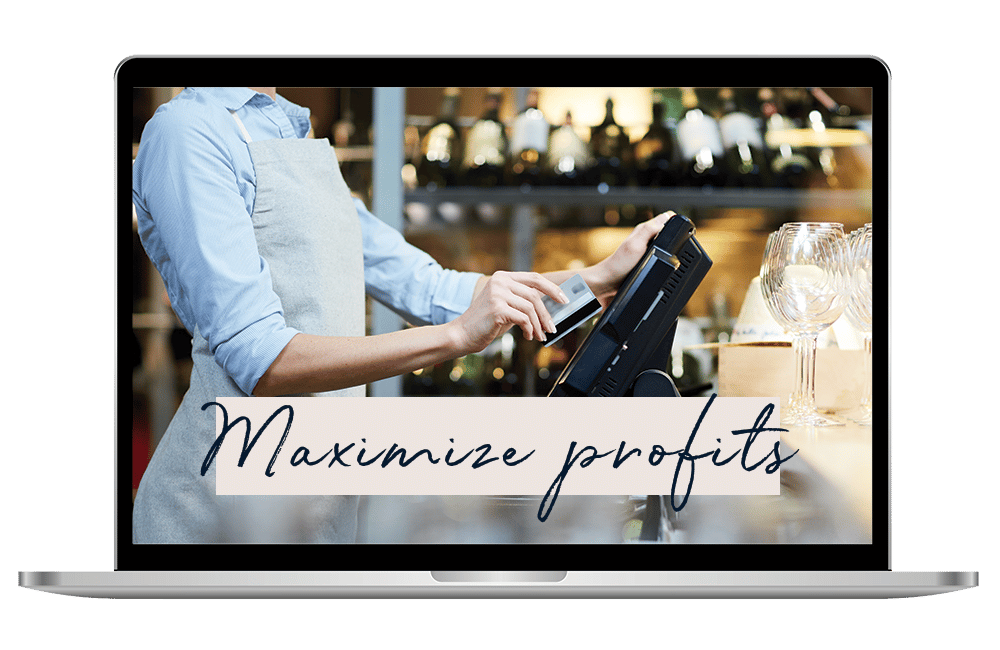
The three costly mistakes you could unknowingly be making?
Find out in this FREE guide and restaurant assessment specifically designed to reveal the unexpected hurdles standing between you and exponential business growth.
Thank You To Our Sponsors
Increase restaurant sales, optimize guest throughput, and boost customer engagement all on one seamless platform.
Request a demo!
Top equipment brands, extensive inventory, everyday low prices, and 60 years serving independent food service operators.
For a limited time only, popmenu is offering our listeners $100 off your first month plus an unchanging lifetime rate.
Request a DEMO:
Want to become a podcast sponsor?
Please get in touch with Roger at roger@restaurantrockstars.com
